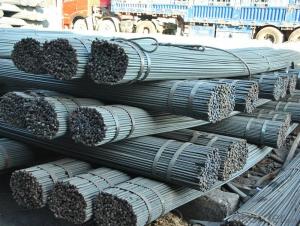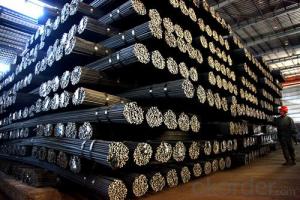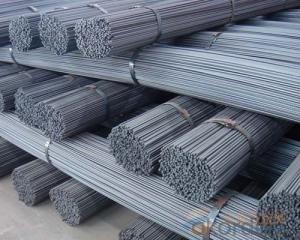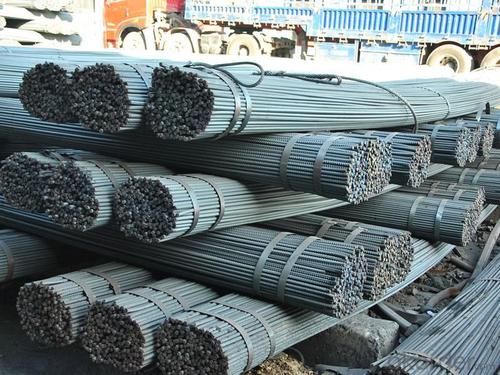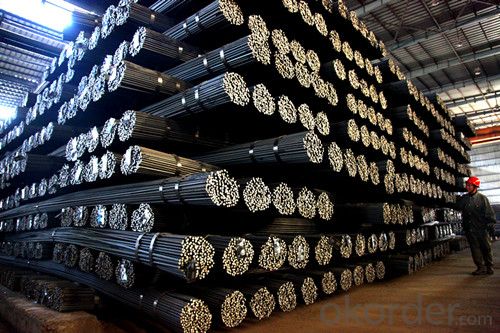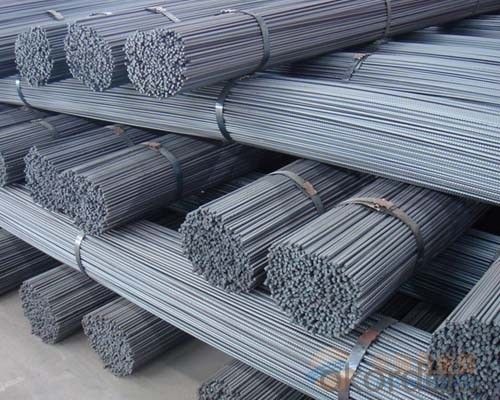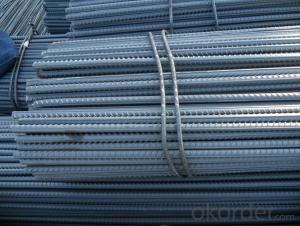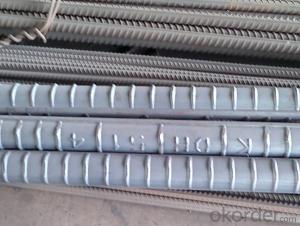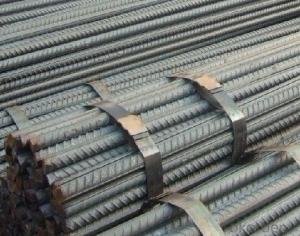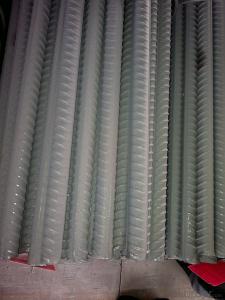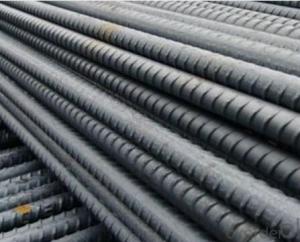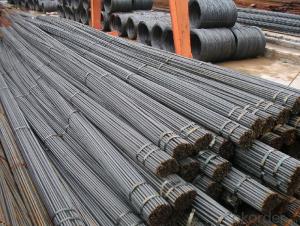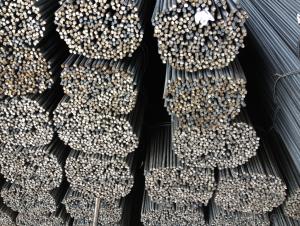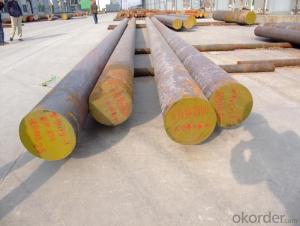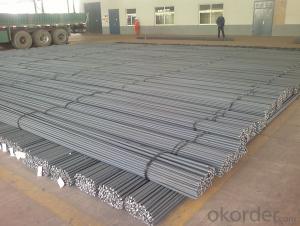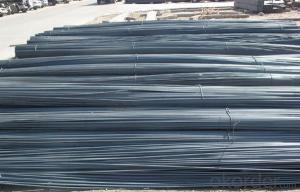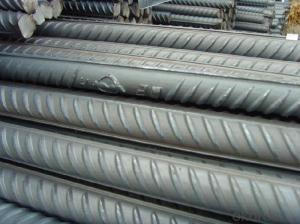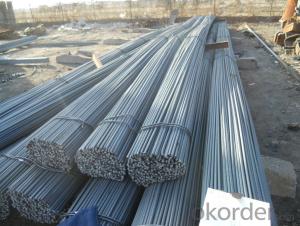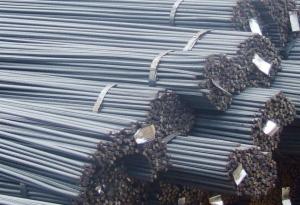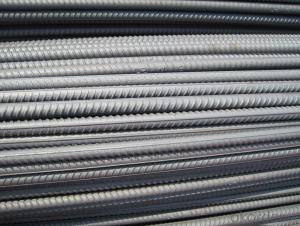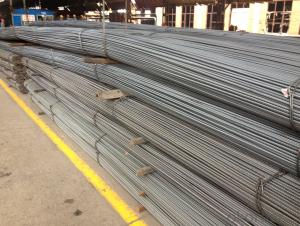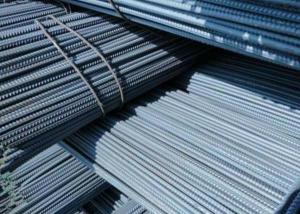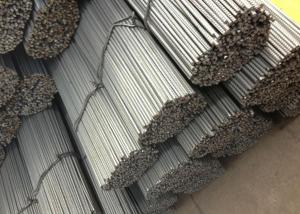Deformed Steel Bar Iron Rods For Construction/Concrete
- Loading Port:
- Shanghai
- Payment Terms:
- TT OR LC
- Min Order Qty:
- 100 m.t.
- Supply Capability:
- 1000 m.t./month
OKorder Service Pledge
OKorder Financial Service
You Might Also Like
deformed steel bar grade 40
material: HRB400, BS4449 GR460B
size: 8-36mmx12m.
short delivery time by bulk or container
deformed steel bar grade 40
material: HRB400, BS4449 GR460B
size: 8-36mmx12m.
short delivery time with bulk or container
packing: Mill standard export packing in bundles/coil, around 2tons/bundle.
country of Origin: China
delivery Time: Within a 35 days
Shipment: by bulk vessel or by container
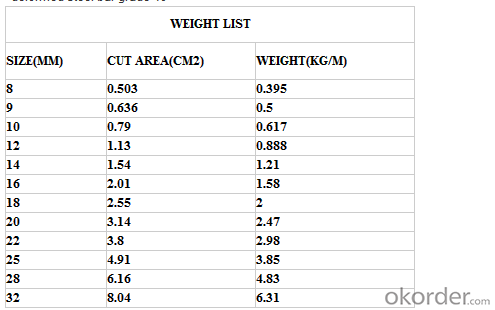
Leading goods:
section steel:angles,channels,I-beam,H-beam;
coils:cold/hot rolled coils,PPGI,galvanized coils,plate,checkered plate,cutting steel plate,steel strip;
wire rod:steel wire,deformed wire,bar;
pipe:seamless pipe,rectangular pipe,welded pipe,spiral welded pipe,pipe fittings;
stainless steel:steel sheets,stainless steel strips,stainless bar,stainless tube;
special:weathering steel,shipbuilding steel;
construction steel:C-channel,Z-channel,T-bar,high-speed divider plate,corrugated steel plate,steel grating.
Advantage:
We are the spot supplier, Six huge warehouses which can hold 20,000 MT goods.It makes the cost lower than others,we can provide the competitive price for you.
Delivery time:
Normal sizes can be provided in 7days, the others should be ready in 30---45 days.
Further treatment:
We can offer cutting,painting,drilling holes,bending,threading, welding,galvanization,packing etc.
Security interest:
We have already passed the ISO9001, BV and SGS authentication which makes the quality secured.
If you have the interest in any of the products we can provided,
pls don't hesitate to connect with me. Looking forward to cooperate with you.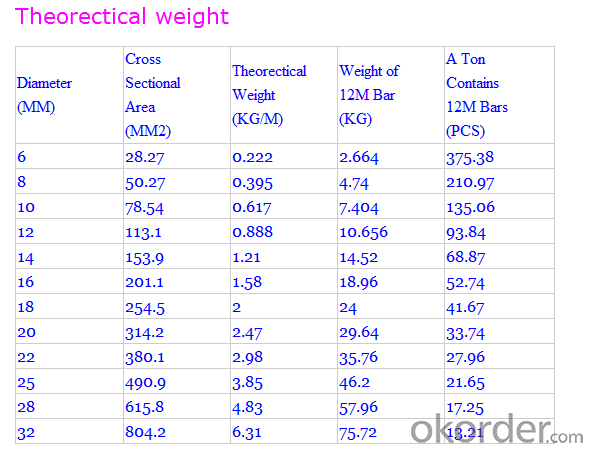
FAQ of Steel Deformed Bar
1. More than 10 years experience in this industry
2. 100,000 tons exporting per month
3. Professional foreign trade tea
4. OEM&ODM capacity
5. High quality assured & competitive price
6. Try our best to meet your needs & save your budget
7. Very popular in Southeast Asia, Africa, Mid-East and South America etc.
8. VIP membership system, first time customers and long-term cooperation customers can get extra discount on some products.
- Q: Which is more expensive, rebar or round steel? Which is your business opportunity, such as thread steel and round bar?
- The two thread steel and round steel, which will be more expensive, steel and round steel prices now are soaring, steel prices per ton in 4300 yuan / ton, quality steel grade three Beijing qianshengcheng price is in 3950-4200 yuan / ton.
- Q: How are steel rebars stored to prevent damage?
- Steel rebars are commonly stored to prevent damage in a few different ways. Firstly, they are typically stored in a clean, dry area that is sheltered from the elements. This helps to prevent rust and corrosion, which can weaken the rebars over time. Additionally, rebars are often stored off the ground, either on pallets or racks, to prevent contact with moisture and dirt. This also makes them easier to access and inspect. Furthermore, rebars are sometimes bundled together and securely tied using wire or bands to ensure they remain in place during storage and transportation. This prevents any accidental movement or shifting that could potentially cause damage. In some cases, rebars may also be coated with a protective layer, such as epoxy or plastic, to provide an additional barrier against moisture and other corrosive elements. Lastly, it is important to handle and transport rebars with care to prevent any accidental damage. They should be lifted and moved using appropriate equipment, such as cranes or forklifts, and workers should be trained in proper handling techniques to minimize the risk of any bending, twisting, or other forms of physical damage. Overall, by storing steel rebars in a clean, dry area, off the ground, bundled securely, and handled with care, the risk of damage can be significantly reduced, ensuring that the rebars remain in good condition for their intended use in construction projects.
- Q: Can steel rebars be used in structures with high radiation shielding requirements?
- Structures with high radiation shielding requirements can indeed utilize steel rebars. Steel is renowned for its remarkable strength and durability, making it a favored option for reinforcing concrete structures. In terms of radiation shielding, steel rebars possess the capability to effectively offer a certain level of protection due to their dense composition. Although steel itself is not as potent a radiation shield as materials like lead or concrete, it still plays a role in reducing radiation transmission. The density of steel aids in dispersing and absorbing some of the radiation that passes through the structure, thus diminishing overall exposure. However, it is crucial to recognize that structures with exceptionally high radiation shielding requirements may necessitate additional measures. These measures could involve incorporating other radiation-absorbing materials such as lead or concrete, or implementing specific design features to enhance the structure's shielding capabilities. Ultimately, the selection of materials and design considerations should be made in collaboration with radiation safety experts and engineers who can evaluate the specific shielding requirements and propose the most suitable solutions.
- Q: What are the common problems associated with steel rebars in construction?
- There are several common problems associated with steel rebars in construction. One of the main issues is corrosion. Steel rebars are susceptible to rusting when exposed to moisture and oxygen, especially in humid or coastal environments. This can compromise the integrity of the rebars and weaken the overall structure. Another problem is improper installation. If rebars are not positioned correctly or are not adequately secured, they may not provide the necessary reinforcement and support. This can lead to structural failures and safety hazards. Additionally, the size and spacing of rebars can be a concern. If the rebars are too small or spaced too far apart, they may not effectively distribute loads or resist bending and cracking. On the other hand, if the rebars are too large or placed too close together, it can increase construction costs and make the concrete mix difficult to work with. Another challenge is the potential for poor bonding between the rebar and the concrete. If there is inadequate contact or bonding between the two materials, it can compromise the structural integrity and reduce the load-bearing capacity of the reinforced concrete. Lastly, the quality of the steel rebars themselves can be an issue. Low-quality or substandard rebars may have defects, such as impurities or inconsistencies in their composition, which can weaken the reinforcement and compromise the overall strength of the structure. To mitigate these problems, it is important to use high-quality rebars, follow proper installation techniques, and ensure proper maintenance and protection against corrosion. Regular inspections and testing can also help identify any issues and ensure the longevity and safety of the reinforced concrete structure.
- Q: How do steel rebars contribute to the strength of concrete?
- The strength of concrete is enhanced in various ways by steel rebars. Firstly, they increase the tensile strength of concrete, which is otherwise relatively low. Although concrete is excellent at withstanding compression, it is weak when it comes to resisting tension. This is where steel rebars come into play. By embedding them within the concrete, they provide extra strength and help prevent cracks from forming and spreading. Secondly, the bond between concrete and the reinforcement material is improved by steel rebars. The ribbed surface of the rebars creates a better grip with the concrete, ensuring a stronger bond. This bond is crucial as it allows the concrete and steel to work together, distributing the loads and minimizing the risk of structural failure. Furthermore, the overall durability and longevity of concrete structures are increased by steel rebars. They are resistant to corrosion, which is a major concern in coastal or high humidity areas. The corrosion resistance of rebars ensures that the concrete remains structurally sound for a longer period, reducing maintenance costs and extending the lifespan of the structure. In addition to their strength-enhancing abilities, steel rebars also contribute to the structural stability of concrete elements. They help reinforce critical areas such as beams, columns, and foundations, where high loads and forces are present. By providing additional support and reinforcement, steel rebars help prevent excessive deflection, bending, or failure of these elements under heavy loads. To summarize, steel rebars are crucial in enhancing the strength of concrete structures by improving tensile strength, bond strength, durability, and overall structural stability. Incorporating them into concrete elements is essential to ensure the longevity and safety of various construction projects.
- Q: Can steel rebars be used in structures with high thermal insulation requirements?
- In structures requiring high thermal insulation, the use of steel rebars is possible, but precautions must be taken to minimize thermal bridging. Steel, being an efficient conductor of heat, can compromise the insulation of the structure if the rebars are not adequately insulated. However, there are various strategies available to tackle this issue. One possible approach involves utilizing rebars with lower thermal conductivity, like stainless steel rebars, which offer superior insulation properties compared to regular steel rebars. Another option is to thermally separate the rebars by applying insulation materials or coatings around them to prevent heat transfer. Additionally, meticulous detailing and design play a crucial role in reducing thermal bridging. Ensuring proper embedding of rebars within the insulation layer and avoiding direct contact between the rebars and the structure's exterior or interior surfaces can effectively minimize heat transfer. In conclusion, although steel rebars can be used in structures with high thermal insulation requirements, it is essential to implement appropriate measures to address thermal bridging and maintain the desired insulation level.
- Q: Can steel rebars be used in structures with high resistance to earthquakes?
- Yes, steel rebars can be used in structures with high resistance to earthquakes. Steel rebars are commonly used in reinforced concrete structures to enhance their strength and durability. In earthquake-prone areas, it is crucial to design and construct buildings that can withstand seismic forces. Steel rebars, when properly incorporated into the structural design, can help enhance the overall seismic performance of a building. Steel rebars provide several advantages in earthquake-resistant structures. Firstly, they increase the tensile strength of concrete, which is otherwise weak in tension. This reinforcement helps to prevent cracking and failure of the concrete during seismic events. Additionally, steel rebars can improve the ductility of the structure, allowing it to absorb and dissipate energy during an earthquake. This ductile behavior helps to minimize structural damage and ensures that the building remains stable and safe. Furthermore, steel rebars can be used in conjunction with other seismic design techniques to enhance the overall performance of the structure. For example, they can be combined with special concrete mixes, such as high-strength or fiber-reinforced concrete, to further improve the seismic resistance. Additionally, advanced structural systems like moment frames or shear walls can be integrated with steel rebars to provide even greater earthquake resistance. However, it is important to note that the earthquake resistance of a structure does not solely rely on the use of steel rebars. Proper design, construction techniques, and adherence to seismic building codes are also crucial factors. Engineers must consider various aspects such as the building's location, soil conditions, and expected seismic loads to ensure the structural integrity and safety of the building. In conclusion, steel rebars can be effectively used in structures with high resistance to earthquakes. Their inclusion in reinforced concrete structures enhances the tensile strength and ductility, enabling the building to withstand seismic forces. However, it is essential to implement comprehensive seismic design strategies and adhere to building codes to ensure the overall safety and performance of the structure.
- Q: What are the guidelines for proper tying of steel rebars in concrete structures?
- To ensure the structural integrity and durability of concrete structures, it is crucial to adhere to guidelines for the proper tying of steel rebars. Here are some important guidelines to consider: 1. Rebar Placement: Before tying, accurately position the rebars according to the structural drawings and design specifications. Place them at the designated locations and depths, ensuring proper spacing to provide the necessary strength and reinforcement. 2. Tying Tools: Utilize suitable tools like pliers or rebar tying machines for secure and proper tying. Ensure that the tools are in good condition and appropriate for the size and type of rebars being used. 3. Tying Technique: Employ a consistent and efficient tying technique. Begin by securely holding the rebars together at the intersection point. Wrap the tie wire around both rebars multiple times, ensuring tight and firm connections. Properly twist and neatly cut the tie wire to avoid any protrusions. 4. Tie Wire Selection: Use high-quality tie wires with sufficient strength to withstand tension and load requirements. Opt for corrosion-resistant materials such as galvanized steel or stainless steel to prevent rusting and deterioration over time. 5. Tying Spacing: Adhere to the specified tying spacing as per the design requirements. Adequate spacing between ties helps maintain rebars in their designated positions, preventing displacement during concrete pouring and subsequent curing. 6. Tying Quantity: Tie rebars at suitable intervals to ensure ample connection and reinforcement. The number of ties needed depends on the size, shape, length of rebars, and structural design specifications. 7. Tying Consistency: Maintain consistency in tying throughout the entire concrete structure. Uneven or inconsistent tying can result in weak points, reduced reinforcement, and compromised structural integrity. 8. Tying Safety: Prioritize safety during the tying process. Wear appropriate personal protective equipment (PPE) like gloves and safety glasses to prevent injuries. Take precautions to avoid tripping hazards and ensure a safe working environment. 9. Inspection and Quality Control: Regularly inspect the tied rebars to ensure compliance with design specifications and quality standards. Conduct visual inspections and perform pull tests to assess the strength and effectiveness of the ties. 10. Compliance with Codes and Standards: Adhere to local building codes, industry standards, and engineering guidelines specific to your region. These codes provide essential requirements for rebar tying, ensuring the durability and safety of the concrete structure. By following these guidelines, construction professionals can enhance the strength, stability, and longevity of concrete structures through proper tying of steel rebars.
- Q: What are the main uses of steel rebars?
- Steel rebars, otherwise known as reinforcing bars, serve as a crucial component in construction and civil engineering endeavors, granting robustness and steadiness to concrete structures. The primary applications of steel rebars encompass the following: 1. Reinforcement of Concrete: Steel rebars are strategically integrated within concrete structures to heighten their tensile strength. While concrete exhibits commendable resistance against compressive forces, it remains vulnerable in terms of tension. By incorporating rebars, the resulting composite material (reinforced concrete) is endowed with the ability to withstand both compressive and tensile forces, rendering it suitable for various applications such as building columns, beams, slabs, and foundations. 2. Enhancement of Structural Stability: Steel rebars play a pivotal role in elevating the structural stability of edifices and infrastructures. They facilitate the uniform distribution of loads across the structure, preventing the occurrence of cracks, sagging, or collapse. Through the reinforcement of concrete elements with rebars, structures become capable of enduring substantial loads, seismic activity, and other external forces. 3. Bridges and Highways: Steel rebars find extensive employment in the construction of bridges and highways. As bridges are routinely subjected to substantial loads and harsh environmental conditions, robust and durable reinforcement is imperative. Steel rebars ensure the longevity and structural integrity of these critical infrastructure projects. 4. Retaining Walls and Tunnels: Retaining walls serve the purpose of holding back soil or other substances, thereby preventing erosion. Steel rebars are commonly employed to reinforce these structures, enabling them to withstand the lateral pressures exerted by the retained material. Similarly, in tunnel construction, rebars bestow strength upon the concrete lining, ensuring stability and averting collapse. 5. Foundations: Steel rebars form an indispensable constituent in the construction of building foundations. They contribute to the even distribution of the structure's weight onto the ground, thereby averting the occurrence of settlement or sinking. Furthermore, rebars anchor the foundation to the ground, endowing it with stability against soil movement or seismic forces. 6. Pre-stressed and Post-tensioned Concrete: In the realm of pre-stressed and post-tensioned concrete construction, steel rebars are employed to introduce compressive forces into the concrete members. This technique elevates the structural performance by diminishing tensile stress, augmenting load-bearing capacity, and minimizing cracking. 7. Masonry Reinforcement: Steel rebars are also utilized to reinforce masonry structures such as walls, columns, and arches. By embedding rebars within mortar joints or cores, the overall strength and stability of the masonry system are enhanced, enabling it to withstand lateral loads and seismic forces. To summarize, steel rebars are indispensable in contemporary construction endeavors, furnishing concrete structures with strength, stability, and durability. By virtue of their capacity to resist tensile forces, they ensure the well-being and longevity of buildings, bridges, highways, tunnels, and other crucial infrastructure projects.
- Q: Can steel rebars be used in seawater desalination plants?
- Yes, steel rebars can be used in seawater desalination plants, but it is important to consider the corrosion potential of steel in a saline environment. Proper corrosion protection measures, such as using corrosion-resistant coatings or stainless steel rebars, should be implemented to ensure the longevity and structural integrity of the plant.
Send your message to us
Deformed Steel Bar Iron Rods For Construction/Concrete
- Loading Port:
- Shanghai
- Payment Terms:
- TT OR LC
- Min Order Qty:
- 100 m.t.
- Supply Capability:
- 1000 m.t./month
OKorder Service Pledge
OKorder Financial Service
Similar products
Hot products
Hot Searches
Related keywords
